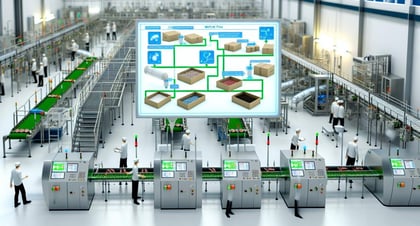Streamlining Material Flow
In food and beverage manufacturing, where consumer demands fluctuate and market trends evolve rapidly, material flow optimization stands as a cornerstone of operational efficiency. As a Plant Manager, you are tasked with overseeing the intricate processes that transform raw ingredients into finished products while ensuring timely delivery and minimal waste.
In this blog, we look into the significance of material flow optimization and explore how integrating advanced planning and scheduling solutions like PlanetTogether with ERP, SCM, and MES systems can revolutionize your operations.

Material Flow Optimization
Material flow optimization involves the strategic management of resources, from raw materials to finished goods, to achieve maximum efficiency and productivity. It encompasses various aspects such as inventory management, production scheduling, transportation logistics, and waste reduction. In the context of food and beverage manufacturing, where perishable ingredients and strict quality standards prevail, optimizing material flow becomes even more crucial.
Challenges Faced by Plant Managers
Plant Managers encounter numerous challenges in their quest for efficient material flow:
Complex Supply Chains: Food and beverage supply chains are often complex, involving multiple suppliers, distributors, and retailers. Coordinating these disparate entities while maintaining optimal inventory levels can be daunting.
Production Variability: Fluctuating demand, seasonal trends, and unforeseen disruptions pose significant challenges to production planning and scheduling. Balancing supply and demand amidst such variability requires agile and responsive strategies.
Regulatory Compliance: Stringent regulations governing food safety, labeling, and traceability necessitate meticulous record-keeping and compliance measures. Non-compliance can result in costly fines and reputational damage.
Resource Constraints: Limited resources such as raw materials, labor, and equipment capacity must be allocated judiciously to maximize output without compromising quality or safety standards.


The Role of Advanced Planning and Scheduling (APS) Solutions
Advanced Planning and Scheduling (APS) solutions like PlanetTogether offer a comprehensive approach to material flow optimization. By leveraging advanced algorithms and real-time data analytics, these solutions empower Plant Managers to:
Optimize Production Scheduling: APS solutions enable dynamic production scheduling based on demand forecasts, resource availability, and production constraints. By synchronizing production activities with customer orders and inventory levels, Plant Managers can minimize lead times and maximize throughput.
Reduce Inventory Costs: By synchronizing production and inventory levels, APS solutions help minimize excess inventory and stockouts, thereby reducing carrying costs and improving cash flow. Just-in-time (JIT) inventory management principles are seamlessly integrated into the production process, ensuring optimal inventory levels without overstocking.
Enhance Supply Chain Visibility: Integrating APS solutions with ERP, SCM, and MES systems provides real-time visibility into the entire supply chain, from raw material procurement to finished product delivery. Plant Managers can track inventory movements, monitor production progress, and identify bottlenecks or inefficiencies in the supply chain.
Improve Decision-Making: By providing actionable insights and scenario analysis capabilities, APS solutions empower Plant Managers to make informed decisions in real-time. Whether adjusting production schedules to accommodate rush orders or reallocating resources to mitigate disruptions, Plant Managers can respond swiftly to changing market dynamics.

Integration with ERP, SCM, and MES Systems
The seamless integration between APS solutions like PlanetTogether and leading ERP, SCM, and MES systems (such as SAP, Oracle, Microsoft, Kinaxis, and Aveva) further enhances material flow optimization efforts. Key benefits of integration include:
Data Synchronization: Integration ensures that data flows seamlessly between different systems, eliminating manual data entry errors and discrepancies. Real-time data synchronization enables accurate demand forecasting, inventory management, and production planning.
Cross-Functional Collaboration: Integration fosters collaboration between departments such as production, procurement, logistics, and finance. Cross-functional teams can access relevant data and collaborate on decision-making, leading to more aligned and coordinated operations.
End-to-End Visibility: Integration provides end-to-end visibility into the entire value chain, enabling stakeholders to track materials, orders, and shipments across multiple touchpoints. This visibility facilitates proactive problem-solving and enables timely interventions to prevent disruptions.
Streamlined Processes: By automating data exchange and streamlining processes, integration reduces administrative overhead and improves operational efficiency. Plant Managers can focus on strategic initiatives rather than manual data reconciliation tasks.
Material flow optimization is essential for Plant Managers in food and beverage manufacturing facilities seeking to improve operational efficiency, reduce costs, and enhance customer satisfaction. By leveraging advanced planning and scheduling solutions like PlanetTogether and integrating them with ERP, SCM, and MES systems, Plant Managers can overcome challenges, streamline processes, and achieve sustainable competitive advantage.
Embracing digital transformation and adopting a holistic approach to material flow optimization will position food and beverage manufacturers for success in an increasingly competitive marketplace. Are you ready to take your manufacturing operations to the next level? Contact us today to learn more about how PlanetTogether can help you achieve your goals and drive success in your industry.























LEAVE A COMMENT